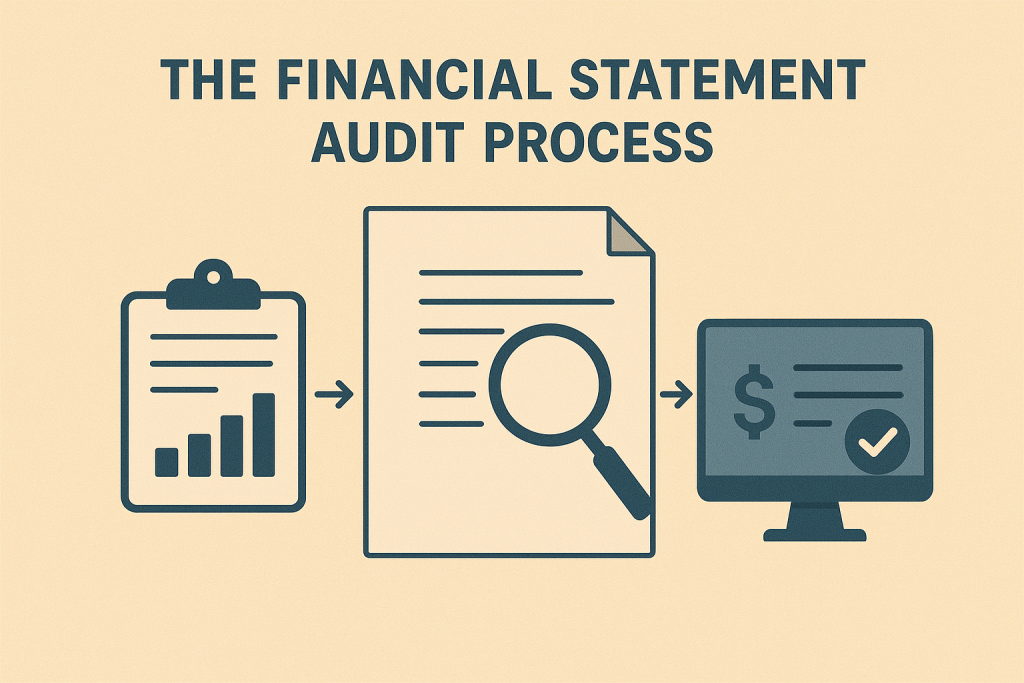
Auditing the financial statements of a business is not merely a technical procedure; it is a key determinant of the accuracy and reliability of financial information. It serves as a crucial step to ensure that the figures and disclosures published by the business are transparent, compliant with regulations, and aligned with accounting and auditing standards.
- How is the Financial Statement Audit Process Understood?
The financial statement audit process not only involves verifying the accuracy of data but also plays a broader role in promoting transparency, attracting investments, and building trust in the marketplace. In today’s competitive and dynamic business environment, establishing a robust and reliable financial audit process is critical for the growth and sustainability of any enterprise.
According to Clause 1, Article 3 of the Accounting Law 2015, as amended and supplemented in 2024, financial statements are defined as a system of economic and financial information of an accounting entity, prepared and presented in accordance with accounting standards and regulations.
The financial statement audit is the process of examining and verifying the accuracy and fairness of accounting data and financial reports of accounting entities. The purpose of financial statement audits is to serve the needs of stakeholders who rely on the financial statements of the enterprise. Accounting and auditing standards form the foundation for evaluating the financial statement audit.
- The Financial Statement Audit Process
Auditors must design a specific audit process to collect sufficient information as the basis for concluding the accuracy and fairness of financial statements. While each auditing firm may follow a slightly different process, the financial statement audit process generally consists of three main steps:
Step 1: Audit Planning
Auditors and audit firms frequently prepare an audit plan that clearly outlines the scope of the audit and the proposed methodology. This plan not only specifies the intended scope and approach for the financial statement audit but also serves as a solid foundation for subsequent auditing steps.
During this phase, auditors conduct surveys, gain an in-depth understanding of the client, and assess the internal control system. Additionally, audit firms ensure that personnel and resources are adequately prepared to perform the financial statement audit accurately and effectively.
Step 2: Conducting the Audit
At this stage, the audit team applies their expertise using audit methods and techniques tailored to each specific business to gather accurate information. This process involves not just executing the audit plan but also dynamically adjusting financial strategies to provide a comprehensive evaluation of the enterprise’s financial position through its financial statements.
Auditors carry out control procedures, analytical reviews, and detailed testing of business activities based on their assessment of the client’s internal control system. This enables them to approach the information more accurately and objectively, forming clear opinions on the reliability and accuracy of the financial statements.
Step 3: Summarizing and Concluding the Audit
Upon completing the analysis and evaluation, auditors issue conclusions regarding the financial statements, which are recorded in the audit report or memorandum. Before finalizing conclusions, auditors or audit firms must:
- Verify unexpected liabilities;
- Assess events occurring after the end of the accounting period;
- Obtain management representations, if necessary.
Finally, auditors consolidate their findings and prepare the Financial Statement Audit Report. Businesses may choose to fully or partially accept the conclusions of this audit report.
In conclusion, the financial statement audit process not only ensures the accuracy of financial information but also lays a solid foundation for transparency and trust in business operations. Auditing is not just a high-tech process but also demands profound expertise and meticulous attention across various aspects. Through the audit process, businesses have the opportunity to self-assess, improve, and optimize internal processes, thereby enhancing operational efficiency and competitiveness. Transparent financial reporting helps attract investors and builds strong trust among shareholders and the market. Each step in the audit process contributes to determining the accuracy and fairness of financial statements. From planning, information gathering, analysis, and evaluation to forming opinions and conclusions, every phase is critical and must be carefully executed. The benefits of the audit process extend beyond the business itself to the investor community and consumers. The conclusions provided by financial audit experts promote transparency and trust in financial information. This process serves as a foundation for fostering a healthy and sustainable business environment.
📞 CONTACT LEGAL CONSULTANT:
TLA Law is a leading law firm with a team of highly experienced lawyers specializing in criminal, civil, corporate, marriage and family law, and more. We are committed to providing comprehensive legal support and answering all your legal questions. If you have any further questions, please do not hesitate to contact us.
1. Lawyer Vu Thi Phuong Thanh, Chairman of the Members’ Council, Ha Noi Bar Association
Email: vtpthanh@tlalaw.vn
2. Lawyer Tran My Le, Manager of TLA Law LLC , Ha Noi Bar Association
Email: tmle@tlalaw.vn.
Dinh Phuong Thao

